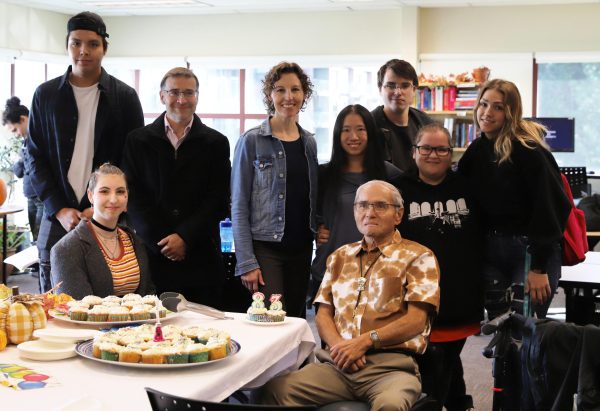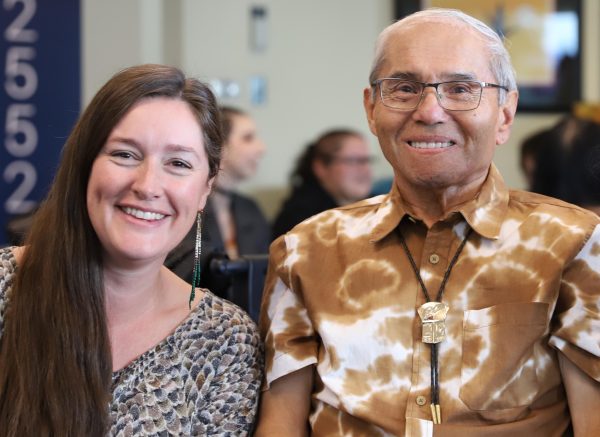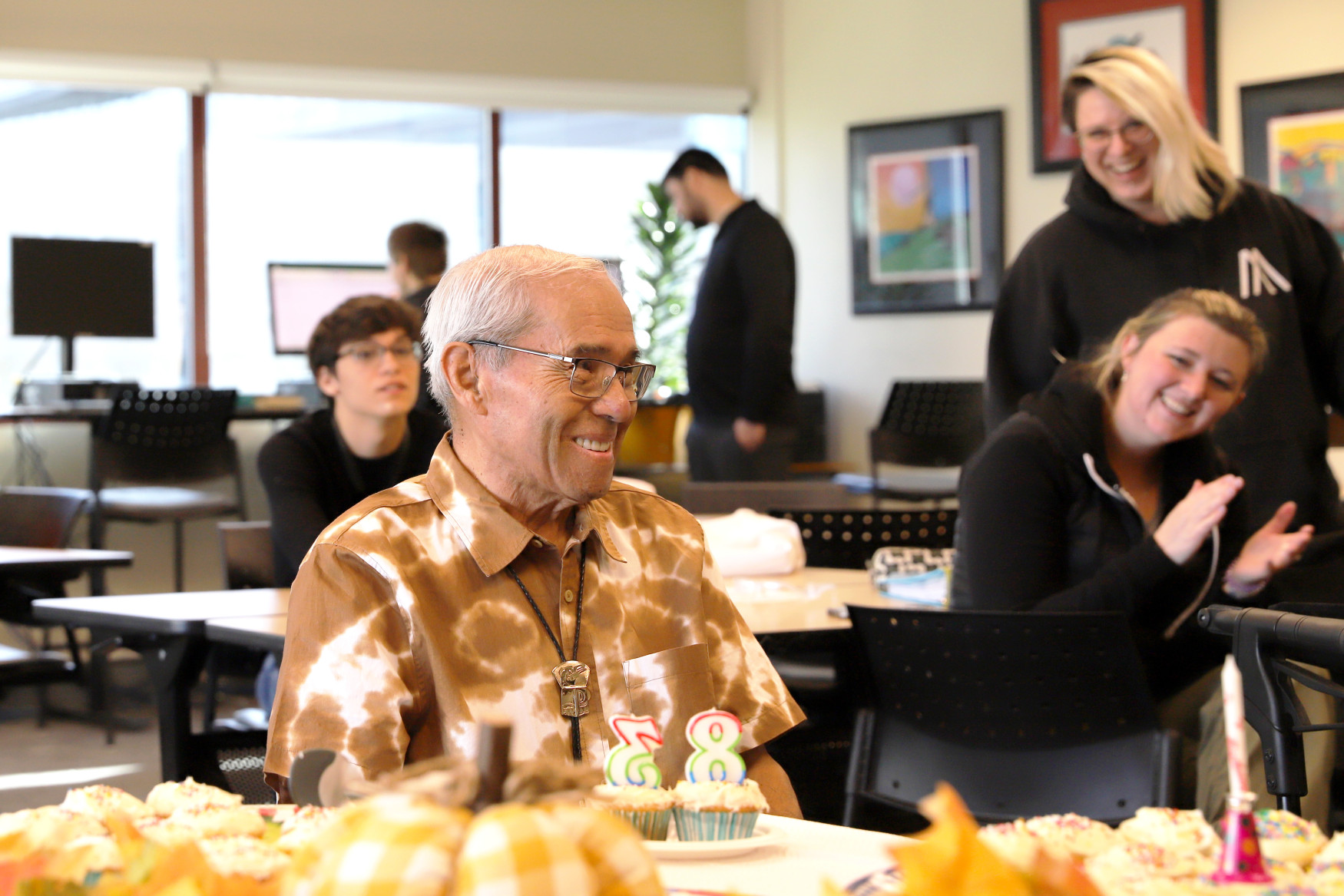Eighty-three-year-old Cecil Mercer is beloved. Just ask his decades younger classmates from Thompson Rivers University’s (TRU) UPrep Program, who joined him with cupcakes and well wishes on campus for his latest birthday celebration.
“He’s the best,” says UPrep student Lisa-Marie Briglio, grinning from ear to ear. “Cecil is family,” adds Cole Drake, another classmate.
“Cecil has really touched the hearts of our faculty, tutors and students,” says Christine Miller, program co-ordinator for UPrep, which delivers grades 10-, 11- and 12-equivalent courses in English, math and science. “His kind nature, jokes and wisdom are so appreciated by anyone who comes into contact with him.”
Inspiring others

Cecil Mercer, front right, his classmates and his teacher, Jane Steiger (back row, third from left)
After more than 65 years of employment, including owning and operating Mercer Logging, the energetic entrepreneur was ready for a new challenge.
“My daughter, who is a part-time student at TRU, suggested I go back to school,” says Mercer, a member of the Nisga’a Nation. “I didn’t know how to do that, and she said it was very simple. So, I said to her, ‘You lead the way.’”
“Cecil has inspired many of our mature students,” says Miller. “It can be really difficult for students in their thirties or forties to brave coming back to school. Cecil’s attitude towards lifelong learning totally blows them away — they know that if you can come back to school at 83, then coming back at 35-years-old isn’t such a big deal.”
Associate Teaching Professor Jane Steiger, who teaches Mercer’s math class, couldn’t agree more.
“Cecil’s dedication to his studies and strong desire to learn are inspiring,” she says. “He approaches his studies like a full-time job and can often be found sitting in the University Preparation Centre working on his math homework or being shamelessly interrupted by my colleagues from the UPrep Department who just love chatting with him.”
Early years
The youngest of eight children, Mercer was born in the Nisga’a Village of Gitlax̱t’aamiks, in the heart of the Nass River Valley of northwestern BC.

Christine Miller and Cecil Mercer
From an early age, Mercer learned the value of hard work.
“Back then there was no running water, so I remember having to pack water from the well,” he says. “I was about five-years-old, so I knew chores from a young age.”
Mercer attended an Indian Day School on the reservation until Grade 3, when he learned to speak English. He and his family also attended mass led by an Anglican priest, every Sunday.
At age nine, he left his community by steamboat to attend St. Michael’s Indian Residential School in Alert Bay on Cormorant Island, northeast of Vancouver Island. The school was operated by the Canadian government and the Anglican Church of Canada.
“The first few days there we had to get adjusted,” says Mercer. “We had a school uniform to wear which included a sweater with a yellow stripe. And I realized years later, when reflecting on that time, that we were marked people.”
Mercer considers himself fortunate to have had family members attending the school with him.
“I had older cousins in the system, which helped,” he says. “We were split up into teams and they were often the leaders, so they had a certain amount of power. In the dining room, they were the table captains, so if ever I wanted more food, like porridge, we’d make a deal. I’d give them my slice of bread, or an apple or an orange, for an extra serving.”
Mercer quickly learned how to look after himself and others when needed.
“Food was limited,” he says, “and we were always hungry, so we learned to steal bread, take potatoes to roast out in the bushes and dig up clams on the side of the bay. We’d share what we had with each other.”
Already familiar with hard work, Mercer applied himself to every task given him.

Cecil Mercer shares a birthday moment with some of his classmates
“Discipline and doing chores weren’t new to me,” he says. “I already had that at home before I left. Sweeping floors, making beds — I knew how to do that. At the residential school though, the expectation was that the top of the bed sheet had to be so tight that a coin would bounce off it, like a trampoline. If it didn’t, we had to remake it until we got it right. So, I got it right.”
The summer after completing Grade 8, Mercer worked on fishing boats, the first of many jobs, with some of his friends. He was 15-years-old. He never saw St. Michael’s again.
“Being at residential school clearly wasn’t what I wanted, I wanted to be home with my mom, but I chose to remember what helped me while I was there — taking pride in myself, working hard and being a leader,” he says. “I’m quite aware that different people had differing experiences, so mine may not have been what others lived.”
Indigenous roots
As a Nisga’a community member, Mercer belongs to a wilp or house, governed by a chief, and to one of four clans.
“I proudly come from the house of Ksim Xsaan and the Ganada clan, symbolized by the raven and the frog,” he says. “And I wear my raven bolo tie whenever I can.”
For many years, Mercer was acknowledged as one of the chiefs (Simoogit) of his house, an honoured and well-respected position within the family and community. He recently passed on his chieftain name, Simoogit Axgalk’an, to his eldest nephew, so he could now represent and lead the family as his uncle did.
“My Nisga’a community means a lot to me,” says Mercer. “And my family — which includes my four kids, three stepkids, nine grandchildren and five great-grandchildren — means everything to me.”
Life lessons
After more than eight decades of life’s journey, Mercer continues to look ahead with purpose and hope.
“I didn’t always make the right decisions as I went through different stages of my life,” he says, “But I kept looking forward. My mother taught me to keep looking ahead with purpose.”
When asked what advice he would share with younger generations, Mercer reflects, saying: “Don’t use that phrase ‘I should’ve,’ and don’t sit around waiting for things to happen. It’s not going to help. If something arises and you think you can do it, then get up and do it. You grow old from doing nothing, so keep doing and learning things.”
For Mercer, being at TRU is a step in the right direction.
“This is all extra knowledge for me right now, which makes me happy. It’s helping my mind work better, too, which is important. I’ve also got my eulogy all figured out, so this is just one more thing to add to it,” he says, smiling.

